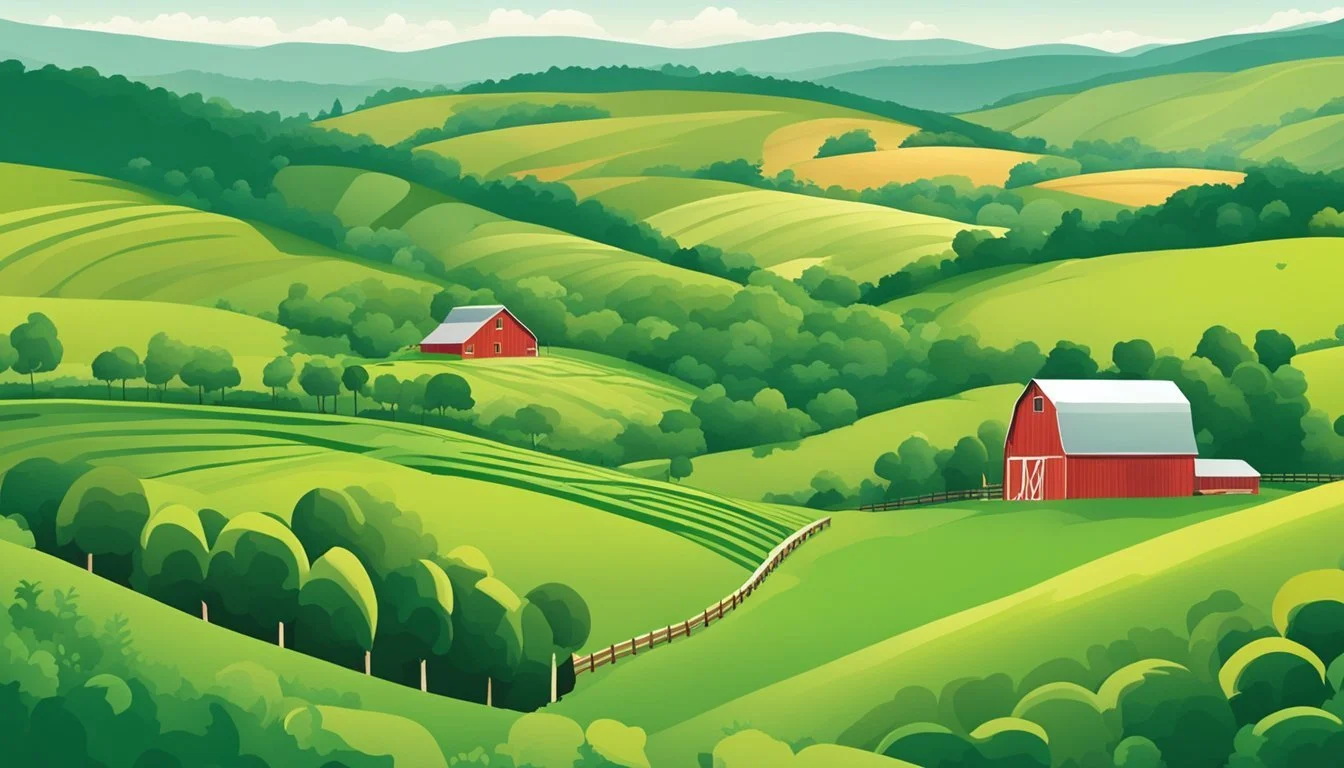New Hampshire Farm Land for Lease
Opportunities and Options
This Article is Part of Our Guide on Navigating Agricultural Leases Across the US
New Hampshire offers diverse opportunities for leasing farm land, catering to a range of agricultural projects and ventures. The state's varied landscape includes areas suitable for both small-scale farming and extensive agricultural operations. Those interested in leasing can find properties across New Hampshire including in regions like Sullivan County, where there are available parcels of land with different amenities and infrastructure to meet various farming needs.
Leasing farm land in New Hampshire provides a way for farmers to begin or expand their operations without the upfront capital investment of purchasing property. It allows flexibility and can be a strategic move for those looking to tap into the state's agricultural market, which includes traditional crop farming and livestock operations. With options such as short-term and long-term leases, farmers can find arrangements that align with their business plans and personal goals.
For those seeking farm land leases, resources such as local land listings and dedicated platforms provide detailed information about available properties. Prospective tenants can explore options such as the fertile acreage in regions like Walpole, NH, where they can take advantage of existing infrastructure, or seek undeveloped land for customization. With careful research and consideration, farmers can secure land that supports their vision for sustainable and profitable agriculture in New Hampshire.
Understanding Land Leasing in New Hampshire
Leasing land in New Hampshire offers a viable option for farmers who seek to engage in agricultural activities without the financial burden of purchasing property. A land lease is a formal agreement where landowners grant farmers the right to use their land for agricultural purposes.
Types of Leases
Fixed Cash Lease: Farmers pay a set amount of rent regardless of production levels or market rates.
Flexible Cash Lease: Rent is tied to production levels or market rates.
Crop Share Lease: Landowners receive a percentage of the crop yield as rent.
When considering leasing property, it's essential to understand the elements of a lease agreement. These typically include:
Lease duration
Rent payment structure
Rights and responsibilities of each party
Use restrictions of the land
Conditions for lease termination
Leasing land can provide benefits such as:
For Farmers: Easier access to land and a chance to expand operations.
For Landowners: Maintenance of the agricultural status of the land and potential tax benefits.
Before entering a lease, both parties should discuss expectations to ensure a mutual understanding. Access to resources, such as guides specifically tailored to New Hampshire real estate and farming needs, can streamline this process.
In summary, land leasing in New Hampshire is a practical real estate option that supports both local agriculture and land conservation. It requires careful consideration of lease terms and open communication between landowners and farmers.
Types of Agricultural Land for Lease
In New Hampshire, diverse land types cater to different agricultural needs, from cultivating crops to raising livestock. Each type of land offers specific features that are vital for the kind of farming practiced on it.
Tillable Farming Ground
Tillable Farming Ground refers to land that has been prepared for the planting of crops. It is characterized by fertile soil, adequate drainage, and a lack of impediments such as large stones or steep inclines. These lands are essential for crop farmers who require substantial acreage for planting staples like corn, wheat, or soy.
Cattle Pastures
Cattle Pastures provide space for cattle to roam and feed. These lands usually have sturdy fencing, water access, and are often supplemented with shelter for the cattle. Pasturelands support the dairy and beef industries by enabling the grazing necessary for cattle health and growth.
Grazing Land
Grazing Land extends to various livestock, including sheep and goats, beyond just cattle. This type of land is characterized by grasses and other vegetation suitable for grazing animals. Availability of water and natural protection against weather elements are important for these lands.
Arable Agricultural Land
Arable Agricultural Land is dedicated to the cultivation of crops that require annual replanting. It is distinct from permanent crops like orchards. Arable land is evaluated for soil quality, nutrient availability, and its ability to support a wide range of agricultural crops for food or commodity production.
Finding the Right Farm Land to Rent
When seeking farm land for rent in New Hampshire, individuals have a variety of resources at their disposal, including online listing platforms, professional realtors, and customized deal alert programs. It is important to define clear criteria for the type of land needed to ensure the best match.
Land Listing Platforms
Platforms such as LandSearch and LandCashin offer extensive listings where one can browse a range of properties. These marketplaces provide detailed descriptions, allowing renters to filter their search based on specific criteria such as acreage, location, and type of land. Here's how listings might be formatted for clarity:
County Acreage Features Listing Type Suffolk County 12 acres — Land for Lease Sullivan County 8 acres 1,700 sq ft Residential Farm Land
Working with Realtors
Realtors specialize in understanding the agricultural market and can offer personalized service to match renters with properties that fit their needs. Realtors provide expertise in local zonings, land use regulations, and can facilitate the leasing process smoothly.
Deal Alert Programs
For those with specific needs, joining a deal alert program through a platform like LandCashin can be beneficial. These programs send notifications when new listings that match the individual's set criteria—such as the type of land property or desired features—become available. This proactive approach saves time and ensures one does not miss out on potential opportunities.
Lease Agreements and Contracts
In New Hampshire, farm land lease agreements serve as the foundation for a stable and legal relationship between landowners and those interested in cultivating the land for agricultural purposes. Lease contracts are legally binding documents that detail the rights and responsibilities of both the landowner (lessor) and the farmer or rancher (lessee).
Essential Elements of a Farm Lease Agreement:
Parties Involved: The legal names of the lessor and lessee.
Property Description: A detailed description of the leased farm land.
Lease Term: The length of time the agreement is in effect.
Financial Terms: Rent amounts, payment schedules, and any deposit required.
Land Use: Specifications on the types of agricultural activities permitted.
Leasing farm land in New Hampshire typically entails a thorough process of negotiation to ensure both parties’ needs are met. Real estate professionals may be involved to facilitate a fair and transparent agreement process. Prospective lessees should meticulously review all clauses within the lease agreement, as it outlines their operational scope and limitations on the property.
Farm leases may encompass various types of agreements, from simple crop-share leases to more complex arrangements involving large cattle pastures or timber production. Irrespective of the type, it is crucial for all parties to understand the terms and legal implications of their contract to prevent disputes and ensure compliance with New Hampshire's real estate laws.
Evaluating Land Quality and Suitability
When considering leasing farmland in New Hampshire, understanding the land quality and suitability is crucial. Prospective lessees should focus on several key factors:
Soil Type: Different crops require different soil types. Utilizing resources like the Web Soil Survey provides valuable information on the soil composition of various properties.
Land Topology: The slope and elevation can significantly affect farming practices. For example, steep slopes may hinder machinery use, while flat terrains are usually more arable.
Drainage: Proper drainage is essential for certain crops. Land with poor drainage may lead to waterlogged soils, adversely affecting plant health and yield.
Climate: The local climate influences what type of crops can be grown successfully.
Prospective tenants should also consider the acreage size, as the scale of operations can determine the type of farming practicable on the land.
Checklist for Evaluating Land Properties:
Soil quality (pH, nutrients, texture)
Water access and rights
Previous land use and potential contamination
Accessibility for machinery and labor
Proximity to markets and processing facilities
By diligently assessing these elements, renters can gauge a farm's potential and ensure that the chosen acres align with their agricultural goals. It's recommended to involve agricultural extension agents or land trust experts in the evaluation process for informed decision-making.
Cost Considerations
When considering leasing farm land in New Hampshire, prospective lessees must carefully evaluate lease rates and additional expenses associated with the land to determine the overall financial commitment.
Lease Rates
Lease rates for farm land in New Hampshire can vary significantly based on various factors such as location, land quality, accessibility, and amenities provided. In some areas, specific rates are associated with the land's acreage and its potential for agricultural productivity. For instance, an 8-acre lot in Sullivan County could have different rates compared to a 14-acre plot in Morris County. It's essential to directly contact landowners or leasing agents to obtain precise leasing terms and rates.
Additional Expenses
Beyond the base lease rate, tenants must account for additional costs that can affect the overall expense of leasing farm land. These may include:
Utilities: Water, electricity, and gas, if available on the property, can be substantial monthly costs.
Maintenance: Upkeep of the land, buildings, and any equipment included in the lease, are the lessee's responsibility.
Insurance: Lessees typically need liability and property insurance to protect against unforeseen events.
Property taxes: Sometimes the tenant may be responsible for property taxes, depending on the lease agreement.
Improvements: Costs involved in enhancing the land for specific agricultural needs must be evaluated.
Prospective tenants should review the lease agreement carefully to understand which expenses are the landowner's responsibility and which fall to them. These additional expenses can significantly impact the overall cost of leasing and should be factored into the decision-making process.
Legal and Regulatory Aspects of Land Leasing
When considering leasing farmland in New Hampshire, both landowners and tenant farmers must understand the legal and regulatory framework that governs such agreements. These regulations are in place to ensure clarity in the relationship between the landowner and lessee, as well as to uphold certain standards within the county and the country at large.
Lease Agreements The core of any land lease is the agreement or contract. It must detail:
Duration of the lease
Payment terms
Rights and responsibilities of each party
Specifications for use of the land
Land Use Regulations Land leases must comply with local county ordinances and country-wide environmental regulations. This can include:
Zoning laws
Conservation requirements
Crop restrictions
Legal Considerations Documenting a lease with clear terms and conditions helps to:
Prevent legal disputes between parties
Provide evidence of the arrangement
Outline procedures for conflict resolution
Regulatory Compliance Farmers and landowners are responsible for:
Adhering to state and federal agriculture codes
Ensuring animal health and welfare
Following employment and labor laws
Engaging a professional to review or draft a lease can help prevent future legal issues and ensure the tenant and the landowner comply with all state-specific legal and regulatory requirements.
Landowner and Lessee Responsibilities
When leasing farm land in New Hampshire, both landowners and lessees have distinct sets of responsibilities. They must adhere to these to ensure a successful and fair partnership.
Landowners are primarily responsible for ensuring that the property is fit for agricultural use. They must provide clear terms within the lease agreement, specifying the usage of the land and any restrictions. Duties include:
Maintenance: Keeping the property's infrastructure, such as fences and buildings, in good repair.
Insurance: Obtaining necessary liability insurance to protect against any legal claims.
Lessees must use the land in accordance with the lease terms and strive to maintain its condition. Their responsibilities involve:
Farming Practices: Implementing good farming practices that sustain or enhance land productivity.
Communication: Keeping landowners updated on the land's status and any issues.
Below is a quick reference table summarizing key responsibilities:
Responsibility Landowner Lessee Property Maintenance X Adherence to Lease X X Insurance X Farming Practices X Improvement Approvals X Reporting Issues X
The lease should also outline how improvements by the lessee are handled and who holds the liability for different types of accidents or damage. Clarity in these roles promotes an enduring and productive leasing relationship. It is important that both parties are aware of and comply with New Hampshire's specific landowner liability and duty of care laws to avoid potential legal complications.
Case Studies and Success Stories
In New Hampshire, the confluence of farming and conservation efforts has forged notable successes. The Monadnock Conservancy, with its investments in land conservation, has enabled farmers to lease land and thrive, showcasing the positive impacts of concerted real estate strategies dedicated to agricultural use.
One noteworthy initiative involved the collaboration of stakeholders like the Cheshire County Conservation District and University of New Hampshire Cooperative Extension. They facilitated farming arrangements that are both sustainable and profitable, thus contributing to the overall vitality of New Hampshire's agricultural landscape.
Cultivating Success on New Hampshire Farms outlines the synergistic relationship between land use for farming and the benefits to the environment, scenic value, and local culture. The report highlights how agricultural land, through proper management and leasing, continues to be a cornerstone of New Hampshire's identity.
Case Studies Method of Access Acreage Notable Outcome Nature's Candy Farms Ownership, Lease 1/4 acre Diversified farming with a personal touch Innovative Land Trust Leases Long-term Leases Various Secured long-term farming sustainability Farmland Access Legal Toolkit Stories Ownership, Lease 125 acres A multi-generational commitment to cotton and diverse crops
The successes encapsulate a range of approaches from lifetime leases to traditional ownership, and underline the agricultural adaptability in New Hampshire's real estate sector. Through careful planning and community support, these farming enterprises have attained stability and serve as models for upcoming farmers desiring access to farmland through leasing.








